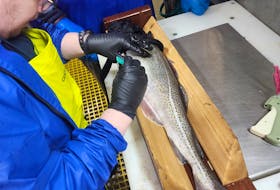Craft breweries in Newfoundland and Labrador had reason to raise a pint glass Wednesday, as the provincial budget outlined a change that will likely help them expand operation and create more jobs.
The province announced the Newfoundland and Labrador Liquor Corp. (NLC) will increase discounts on the commissions breweries pay to the Crown corporation. The commission is a form of taxation these businesses pay the NLC that varies depending on the volume of beer produced.
According to government, this move is expected to save microbreweries more than $1 million. The discounts will range from 95 per cent to 15 per cent based on volume produced.
Justin Fong, chair of the Newfoundland and Labrador Craft Brewers Association, was pleased to hear Wednesday's news. His group has been in discussions with government for almost two years in an effort to change this set up.
"We had a working group formed that basically looked at the taxation across Canada, and Newfoundland was paying way more than the rest of Canada in terms of what the commissions were to produce alcohol," said Fong, also a co-owner of Quidi Vidi Brewery in St. John's. "We were paying about three-and-a-half times more than the Canadian average, and eight times more than the Atlantic average, so just devastatingly high tax rates."
Great news
While he wasn't aware yet of how exactly the new discounts will be applied, Fong expects the change will bring the provincial microbrewing industry more in line with how its peers in other parts of the country are taxed.
"Definitely, definitely great news yesterday," he added.

Chris Conway is a co-owner and general manager of Landwash Brewery in Mount Pearl. His business currently has a discount rate of 55 per cent applied to its first 1,000 hectolitres (hL) produced. It had previously been 50 per cent before the NLC announced new measures at the beginning of May to address the economic impact of the COVID-19 pandemic.
"Even with that, the base rate from which that discount is applied in the province is high, so increasing that to 95 per cent — even for a portion of production like the first 2,000 hL — would put us closer to parity with our Atlantic Canadian colleagues in the craft brewing industry," he told The Telegram in an email.
"It would mean a great deal of savings for small breweries which — especially with taprooms feeling the same pandemic limitations as the restaurant and hospitality industry in general — could greatly aid in both recovering from the pandemic and generating sustainable future growth as many breweries look to sell more beer in distribution channels like the NLC and (convenience store chain) Marie’s Mini Mart."
Expansion opportunities
There are now 18 craft breweries in the province, employing about 300 people and accounting for about three per cent of the Newfoundland and Labrador beer market in terms of sales.
"When you're looking at Canada, the Canadian average is probably about eight-to-10 per cent," Fong said. "Our market is almost three times smaller than you'd see on a national average, and that's a function of how heavily we were taxed. We just don't have the money to reinvest in our companies for more staff, for more production capabilities, that type of stuff.
"What this is going to allow a lot of the breweries to do — if you're Quidi Vidi, you can probably get some more tanks and hire some more people. If you're Port Rexton (Brewing) or some of the other breweries, that might be your expansion to your next facility. And if you're just starting out, that's probably you're canning line or your delivery truck. No matter what stage you are in your life cycle of the business, it's just really meaningful."
Conway agrees with this assessment.
"As more breweries need to invest to adapt to this changing COVID-19 market, savings in commissions will be rolled into more equipment to brew more beer, to distribute more widely and passed through more hands, creating more jobs in production, sales and logistics," he told The Telegram.
"Plus, it hopefully means even more great local craft beer to try. We’re hopeful that this support will bring changes that allow for the kind of growth in our young industry that other provinces have enjoyed.”

Over the last five years, over a dozen new microbreweries have started up in Newfoundland and Labrador. — Andrew Robinson/The Telegram
Job creation
Questions have arisen about whether the microbrewery scene has reached its limit. Last fall, SaltWire Network reported on the proposed Little North Brewhouse in Baie Verte. A representative of the business told SaltWire Network that the Atlantic Canada Opportunities Agency (ACOA) told them the market for microbreweries in this province was oversaturated. An application for funding was denied. ACOA declined to comment on the matter at that time.
However, given how low craft beer’s share of the market is in Newfoundland and Labrador, Fong said he believes there's a lot of potential for further growth. He noted that even with its low market share, microbreweries account for 13 per cent of all jobs in the provincial beer industry.
"When you look at that, what it basically says is every time you buy a craft beer versus a Molson Canadian or a Coors Light, there's three more jobs created per bottle of beer," he said. "In terms of supporting local, it means so much more. What they've done is the start of a great move for taxation. With this tax break, it's going to allow our market to develop more. If we were in the average for Canada — eight-to-10 per cent — it would mean about 400-to-600 more jobs. ... The really nice thing about those jobs is they're not all located in the urban centres. About half of these are in rural parts of Newfoundland. That's a big part of diversifying your economy."









